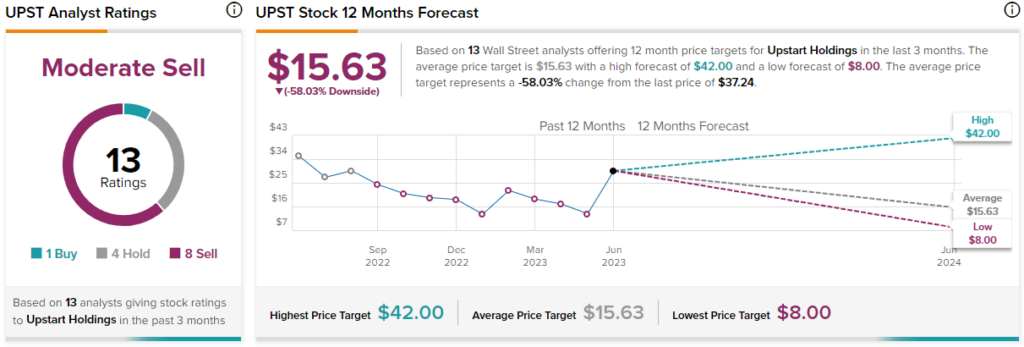It has been quite the show to see Upstart Holdings stock (NASDAQ:UPST) rally by roughly 210% from its May low of $11.93. Even though the cloud-based lending platform’s stock currently sits at around $37, significantly below its previous record high of over $400, the recent surge serves as a resounding vote of confidence from Wall Street.
Pick the best stocks and maximize your portfolio:
- Discover top-rated stocks from highly ranked analysts with Analyst Top Stocks!
- Easily identify outperforming stocks and invest smarter with Top Smart Score Stocks
Moreover, it suggests that Upstart stock may have endured an undue amount of punishment. Consequently, the pressing question arises — can Upstart maintain its remarkable momentum, or would it be prudent for investors to secure some profits and move on?
In my view, the prospects for Upstart to maintain its ongoing rally appear promising. Notably, credit conditions are on an upward trajectory, bolstering the company’s potential for sustained growth. Furthermore, cost-cutting measures are expected to augment profitability, while the substantial $2 billion in secured funding it recently received is a significant figure in relation to the current stock valuation, despite the remarkable gains thus far.
However, it’s prudent to acknowledge that the stock has already experienced a significant surge, and the credit markets continue to exhibit volatility. Therefore, for those who have already achieved substantial profits, it might be wise to secure some gains as a precautionary measure. I am neutral on the stock.

Challenges Persist, but Improvements are in Sight
Upstart’s financial performance continues to be negatively impacted by various challenges, including a rather shaky macroeconomic environment and turbulent credit market conditions. This was illustrated in its most recent Q1 results, in which the company posted a startling 66.8% decline in revenues to $102.9 million.
While the firm’s average loan size rose by 22% compared to the prior-year period, the volume of loan transactions across Upstart’s platform came in at roughly 84,000 loans, suggesting a massive decline year-over-year decline of 82%. This is understandable, given the substantial increase in interest rates over the past year. The rapidity of these hikes inevitably led to a sharp decline in loan origination demand.
Cost-Management Improvements
Rates remain elevated currently, discouraging consumers from taking on expensive loans. That said, with credit conditions gradually improving over time and Upstart implementing prudent cost management, it’s quite likely to see the company’s financials improve notably in the near term.
For instance, in Q1, Upstart’s operating expenses were $235 million, down 15% year-over-year. The bulk of the year-over-year reduction was achieved through sales and marketing, which saw expenses decline by 76% following the trend in lower originations volumes.
Further, between the fourth quarter of last year and the first quarter of this year, management took the necessary steps to reduce the company’s headcount by nearly 30%. Management expects that this action will allow Upstart to return to profitability at a significantly lower loan volume.
Finally, Upstart’s management claims to have identified opportunities to ease technical infrastructure costs by as much as $10 million annually and sublet some unnecessary office space, both of which will directly strengthen the bottom line.
$2 Billion Funding Agreements to Boost Future Outlook
Upstart has received a significant boost with the announcement of multiple long-term funding agreements, which are expected to bring in over $2 billion in capital over the next year. These agreements have been instrumental in fueling the stock’s enduring rally.
While $2 billion may not appear to be an astronomical sum, it is crucial to recognize that Upstart’s market cap had dipped below $1 billion in May and currently stands just above $3 billion. Consequently, the infusion of $2 billion within a single year represents a substantial financial milestone for the company. Moreover, these funding agreements underscore lenders’ robust demand for Upstart’s platform, even amid an unfavorable market environment, thereby demonstrating its inherent value.
Overall, the company expects to start realizing the benefits of operating discipline, margin expansion, and deal-making as soon as next quarter, with management’s Q2 guidance pointing towards strong sequential growth. In particular, UPST expects revenues to land close to $135 million, implying a quarter-over-quarter increase of 31%. The firm also expects its contribution margin to grow to 60% from 58% in Q1, suggesting improving profitability.
Is UPST Stock a Buy or Sell, According to Analysts?
Turning to Wall Street, Upstart Holdings has a Moderate Sell consensus rating based on one Buy, four Holds, and eight Sells assigned in the past three months. At $15.63, the average Upstart stock price target implies 58% downside potential.

The Takeaway
In conclusion, Upstart Stock’s recent rally reflects a vote of confidence from Wall Street and suggests that the company may have faced undeserved punishment. The prospects for Upstart to maintain its momentum appear promising, with credit conditions improving and cost-cutting measures enhancing profitability. Additionally, the $2 billion funding agreements signal strong demand for Upstart’s platform and significantly boost the company’s future outlook.
However, considering the stock’s significant upward movement and the volatility of credit markets, it may be prudent for investors who have already achieved substantial profits to secure some gains. Besides, Wall Street’s Moderate Sell consensus rating indicates the potential downside risk, which is certainly not an encouraging factor regarding the stock’s performance potential.



















